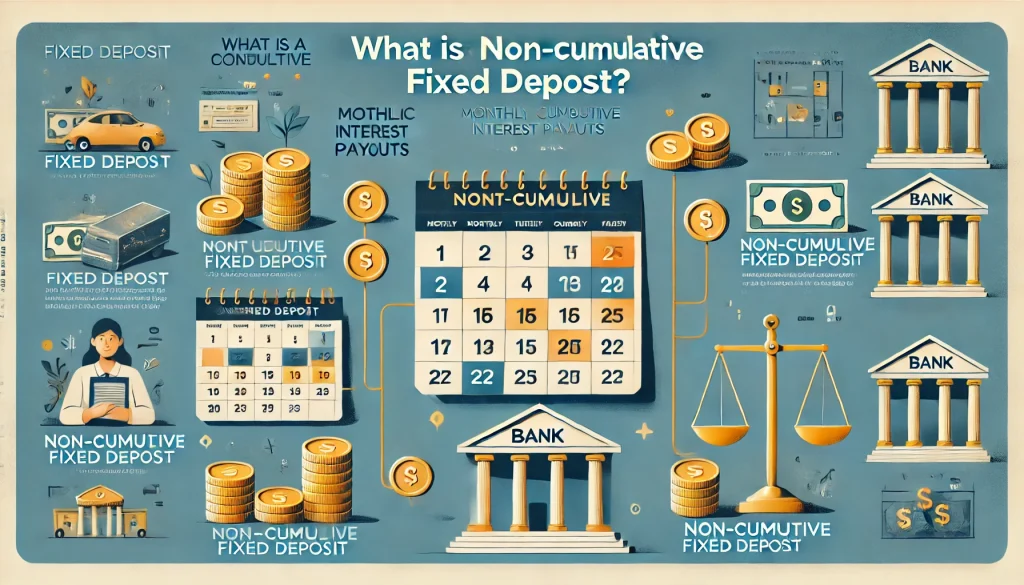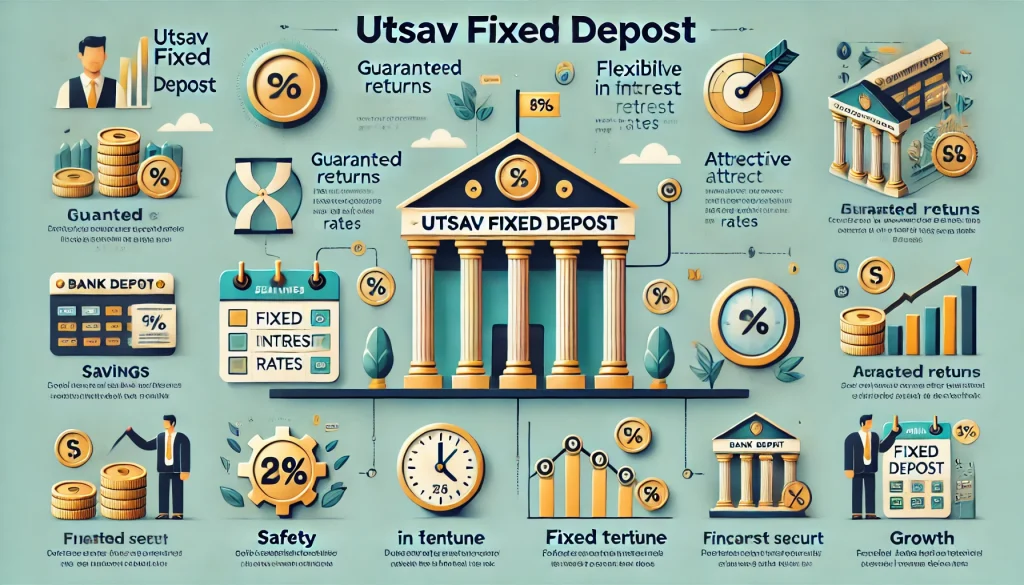
Fixed Deposits have been a popular choice for years for Indian investors. FDs offer a safe and secure way to grow your savings while earning a fixed interest rate for a fixed tenure. Earlier, FDs were majorly offered by Banks, but now there are multiple companies that offer FDs, which are later termed Corporate FD or Company FD. With multiple FD options available in the market, today we will compare Corporate FDs vs Bank FDs.
In this blog, we will compare Corporate and Bank FDs, outlining their features, benefits, and drawbacks. Let’s dive in!
What are Corporate FDs?
Corporate Fixed Deposits are investment options private and public companies offer to raise capital for their business needs. Investors can deposit a specific amount for a fixed tenure and earn interest over the agreed-upon period. Corporate FDs often come with attractive interest rates, making them an appealing choice for investors looking for higher returns.
What are Bank FDs?
Bank Fixed Deposits are similar investment instruments offered by banks. Individuals deposit a certain sum of money for a predetermined period and earn interest on the deposit. Bank FDs are considered one of the safest investment options as the government backs them and come with guaranteed returns.
Corporate FD vs Bank FD: A Detailed Comparison
Now that we have a basic understanding of both Corporate and Bank FDs, let’s delve deeper into their comparison to help you make an informed decision based on your financial objectives.
| Corporate FDs | Bank FDs | |
|---|---|---|
| Interest Rates | Generally higher than Bank FDs but vary based on the issuing company’s credit rating. | Typically offer lower interest rates than Corporate FDs, but the rates remain stable throughout the tenure. |
| Risk | Moderate to High risk, as the deposits are not insured. The company’s financial stability and credit rating are essential considerations. | Extremely Low risk, as DICGC insures Bank FDs up to Rs. 5 lakhs per account. |
| Safety | Lower safety as compared to Bank FDs, as Corporate FDs are not backed by government insurance. | As Bank FDs are insured, high safety provides complete capital protection up to Rs. 5 lakhs. |
| Tenure Flexibility | Offers various tenure options, providing investors with more choices. | Banks provide flexible tenure options, allowing investors to match their investment horizon. |
| Liquidity | Corporate FDs may have a lock-in period, and premature withdrawal may attract penalties. | Bank FDs offer greater liquidity, with easy premature withdrawal options. |
| Credibility | Investors must conduct thorough research on the company’s financial health before investing. | Banks are perceived as highly credible institutions, instilling trust among investors. |
| Taxation | Interest earned is taxable as per the investor’s income tax slab. | Interest earned is taxable as per the investor’s income tax slab. |
| Investment Amount | The minimum investment amount may vary depending on the issuing company’s policies. | The minimum investment amount is usually lower in Bank FDs, making it accessible to more individuals. |
| Interest Payout | Interest payout frequency varies from company to company. | Interest can be paid out monthly, quarterly, or at maturity, depending on the investor’s choice. |
| Senior Citizen Benefits | Some Corporate FDs offer higher interest rates for senior citizens. | Banks often provide additional interest rates to senior citizens, boosting their returns. |
Top Corporate Fixed Deposits
| Bank | General Interest Rates | Senior Citizen Interest Rates |
|---|---|---|
| Bajaj Finance Ltd | 7.40% – 8.35% | 7.65% – 8.60% |
| Shriram Finance Ltd | 7.34% – 8.18% | 7.84% – 8.68% |
| Mahindra Finance | 7.40% – 8.05% | 7.65% – 8.30% |
| Sundaram Finance | 7.45% – 7.75% | 7.95% – 8.25% |
| LIC Housing Finance | 7.25% – 7.75% | 7.75% – 8.00% |
Top Bank Fixed Deposits
| Bank | General Interest Rates | Senior Citizen Interest Rates |
|---|---|---|
| Unity Small Finance Bank | 4.50% – 9.00% | 4.50% – 9.50% |
| Suryoday Small Finance Bank | 4.00% – 8.50% | 4.50% – 9.00% |
| Jana Small Finance Bank | 3.75% – 8.50% | 4.25% – 9.00% |
| Equitas Small Finance Bank | 3.50% – 8.50% | 4.00% – 9.00% |
| ESAF Small Finance Bank | 4.00% – 8.50% | 4.50% – 9.00% |
Key Features of Corporate FDs
- Higher Interest Rates: Corporate FDs typically offer higher interest rates than Bank FDs, making them appealing to investors looking to maximise their returns.
- Diverse Tenures: Investors can choose from various tenure options, ranging from a few months to several years, providing flexibility in meeting their financial goals.
- Credit Ratings: Companies offering Corporate FDs are assigned credit ratings by rating agencies, indicating their financial stability and the likelihood of timely interest payments.
- Higher Risk: While the returns are attractive, Corporate FDs come with a higher risk as they are not insured by the Deposit Insurance and Credit Guarantee Corporation (DICGC), unlike Bank FDs.
Key Features of Bank FDs
- Safety and Security: Bank FDs are considered extremely safe since they are backed by the Deposit Insurance and Credit Guarantee Corporation (DICGC), which insures deposits up to Rs. 5 lakhs per account.
- Fixed Interest Rates: Bank FDs offer fixed interest rates, providing certainty to investors about the returns they will earn over the tenure.
- Flexible Tenure Options: Banks offer a range of tenure options, allowing investors to choose the duration that aligns with their financial goals.
- Nomination Facility: Bank FDs provide a nomination facility, ensuring that the proceeds are transferred to the nominee without any hassles in the event of the investor’s demise.
Conclusion
Now that you are aware of the differences between Corporate FD vs Bank FD, it is clearly evident In conclusion, both Corporate FDs and Bank FDs have their pros and cons, and choosing the right one depends on individual risk appetite, investment goals, and liquidity needs. Bank FDs are known for their safety and liquidity, making them ideal for conservative investors. On the other hand, Corporate FDs offer the potential for higher returns but come with higher risk.
Investors must carefully analyse the terms, interest rates, credibility, and taxation aspects before making an informed decision. Diversification of investment across different instruments is always recommended for a balanced and well-secured portfolio.
FAQs
Corporate FDs carry some level of risk as they depend on the financial stability and credibility of the issuing company. Investors should conduct thorough research before investing.
No, Corporate FDs are not insured like Bank FDs. They do not come under the purview of the government’s deposit insurance scheme.
Senior citizens often prefer Bank FDs due to safety and more trust, making it a more favourable choice.
Corporate FDs usually come with a lock-in period, and premature withdrawal might not be allowed or could attract penalties.
Disclaimer
This article is solely for educational purposes. Stable Money doesn't take any responsibility for the information or claims made in the blog.


